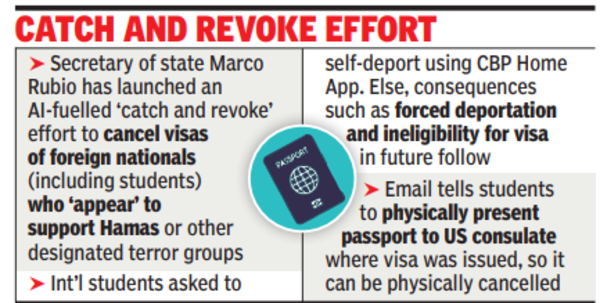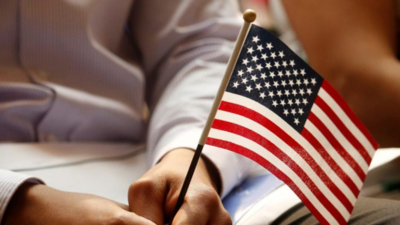Hundreds of international students in the US are getting an email from the state department asking them to self-deport owing to alleged campus activism. Immigration attorneys contacted by TOI affirmed this development and added that a few Indian students may also be at the receiving end of such emails — even for something as innocuous as sharing a social media post.
This crackdown is based on social media reviews being conducted by DOS (which include reviews by consulate officials). Thus, even new student applications, be it for an F (academic study visa), M (vocational study visa) or J (exchange visa) will also come under such social media scrutiny.
Applicants found ‘guilty’ will be denied the opportunity to study in the US.

Students told their SEVIS record terminated
During the academic year 2023-24, the US attracted nearly 11 lakh international students of whom over 3.3 lakh were Indian students, says an Open Doors report.
Axios has earlier reported that secretary of state Marco Rubio has launched an AI-fuelled ‘catch and revoke’ effort to cancel the visas of foreign nationals (including international students) who ‘appear’ to support Hamas or other designated terror groups. Following this, more than 300 foreign students have had their student visas revoked.
The email sent to students reads: “On behalf of the US Department of State, the Bureau of Consular Affairs Visa Office hereby informs you that additional information became available after your visa was issued. As a result, your F-1 visa with expiration date XXXXX was revoked in accordance with Section 221(i) of the US Immigration and Nationality Act, as amended.”
“The Bureau of Consular Affairs Visa Office has alerted the Dept of Homeland Security’s Immigration and Customs Enforcement, which manages the Student Exchange Visitor Program and is responsible for removal. They may notify your designated school official about the revocation of your F-1 visa.”
These students are being asked in the email to self-deport using the CBP Home App. Else, consequences follow such as forced deportation and ineligibility for a US visa in the future. It may be recalled that Ranjani Srinivasan, an Indian doctoral student at Columbia University, had self-deported using this app, after her visa was revoked over alleged campus activism.
Immigration attorneys point out that the email requires the international students who self-deport to physically present their passport to the US consulate where the visa was issued, so that it can be physically cancelled. The student can no longer use this visa, but needs to apply for another visa for travel to the US in the future. “A determination on your eligibility for a visa will be made at that time,” adds the email – and the general view is that obtaining a US visa in the future will be challenging under the tenure of the Trump administration.
The flurry of self-deportation emails that are being sent to students appear to stem from a March 25 internal directive dispatched by Rubio directing mandatory social media reviews of existing international students already in the US and new applicants, state immigration attorneys.
Such students are also being informed by their international student service office that their SEVIS record has been terminated. SEVIS is the web-based information system that the US department of homeland security uses to track and monitor international students during their duration of study. “Students with a terminated SEVIS record must depart the US immediately; there is no grace period following a SEVIS termination. We advise you to depart the US as soon as possible,” states this intimation.
In the backdrop of the emails sent to students, Jath Shao, founder of an immigration law firm, told TOI, “F-1 and J-1 students are usually admitted ‘D/S’, meaning for the duration of their status. There’s a slight distinction between overstay and unlawful presence. Historically, someone admitted D/S has not accrued unlawful presence for the purpose of three-or 10-year bars (for re-entry) unless US Citizenship and Immigration Services makes a formal finding that they are unlawfully present. This is important because if you are formally unlawfully present for more than 180 days or 365 days, it can trigger the three- or 10-year bar, respectively. However, with overstay, it’s more in a grey area –– where the consular officer has more discretion whether to hold that overstay or status violation against the person.”
“USCIS’s page, updated on Jan 25, now states that non-immigrants admitted for the duration of status generally begin accruing unlawful presence the day after their status ends, if they remain in US.”
Immigration attorneys say that students should seek legal counsel to reinstate their SEVIS or defend themselves if removal proceedings are brought against them.




